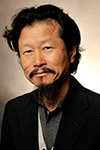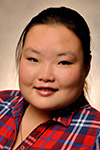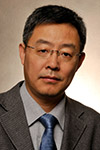Participants
|
|
Mohammad Jahangir Alam is a Bangladeshi national. Currently he is an Associate Professor in Agribusiness and Marketing at the Faculty of Agricultural Economics and Rural Sociology, Bangladesh Agricultural University, Bangladesh. He received his BSc in Agricultural Economics and MS in Agricultural Marketing at Bangladesh Agricultural University. He received his second Master degree in Agricultural Development and PhD in Agricultural Economics at Ghent University, Belgium. He has been a faculty member at Bangladesh Agricultural University since end of 1999. He has been a `Visiting Scholar` at the University of Arkansas and an Erasmus Mundus (of EU) `Visiting Professor` at the Dublin Institute of Technology (DIT), Dublin, Ireland. Moreover, as Commonwealth Fellow, he has been a `Research Fellow` at the SOAS, University of London, UK. He has published more than 25 articles in leading journals, several book chapters and research reports. He has experience working with FAO, IFPRI, Swisscontact, DANIDA, etc either as consultant or as a team leader/member in different research projects. He conducts research on performance of rice market and trade liberalization policies; climatic impacts on price dynamics of rice markets; potential of genetically modified rice for feeding the world food deficit country; role of quality agricultural inputs in transforming Bangladesh agriculture; linking agriculture and nutrition; agricultural input and output markets, safety nets programs/interventions/technology`s impact using quasi-experimental setting; agricultural and food policy worldwide, food and nutrition security. His skills include quantitative and applied economics analyses such as cointegration (linear and non-linear) and vector error correction model, threshold cointegration and threshold vector error correction model, impulse response function, auto-regressive distributed lag model, asymmetric error correction model, value chain models, market efficiency, vector-auto regressive model, stochastic frontier model, policy analysis matrix, partial equilibrium model, general equilibrium model, propensity score-matching analysis etc. He teaches the courses - Agricultural Marketing, Agricultural Price and Policy Analysis, Global Food Issues, Trade Policy in Agriculture, Institutional Economics and Rural Development. |
|
|
Eddie C. Chavez hails from a small farming and fishing town of Balayan in Batangas province, Philippines. Currently, he is a Senior Program Associate in the Department of Agricultural Economics and Agribusiness (AEAB) at the University of Arkansas in Fayetteville. He received his B.S. in Agricultural Engineering from the University of the Philippines at Los Banos. He worked for San Miguel Corporation (SMC) for eleven years in various capacities, starting as a project analyst and promoted steadily to become a farm manager, then a planning and logistics department manager of a subsidiary. With support from SMC’s educational program, he pursued his M.B.A. from the De La Salle University in Manila—balancing between corporate work and graduate school; and taking classes at night. He also underwent training and earned certificate on Strategic Planning. He left for the U.S. in December 1991--giving up his dream corporate career for the good of his family. While looking for a new job in the U.S., he decided to pursue a second master’s degree; and received his M.S. in Agricultural Economics from the University of Arkansas in Fayetteville; and has since worked with his graduate adviser at the Department of Agricultural Economics and Agribusiness for 16 years. He also had the opportunity to work in financial services, starting as a personal financial analyst; and promoted to Regional VP after three years of outstanding performance on sales and prospecting, and personnel recruiting and training. He also co-owns a small Asian grocery store. Ed Chavez manages and maintains the Arkansas Global Rice Model (AGRM), one of a handful of internationally-recognized models in existence that represents the world rice economy. It is a non-spatial, partial statistical simulation econometric model that covers 51 countries/regions, developed, maintained, and continually being improved in AEAB. This model has been used to provide analyses for the Asian Development Bank (ADB), Food and Agriculture Organization of the United Nations (FAO), International Rice Research Institute (IRRI), Organization for Economic Co-operation and Development (OECD), United States Department of Agriculture (USDA), World Bank, as well as many national governments and research institutes. This model allows for policy and market scenario analyses, using both deterministic and stochastic methods. AGRM is currently a collaborative project between AEAB and the Food and Agricultural Policy Research Institute (FAPRI) at the University of Missouri, with additional support from the Arkansas Rice Research and Promotion Board. His research interests are on U.S., ASEAN, African, and global rice economies, with focus on long-term modeling projections, and market and policy impact analyses; impacts of the new U.S. farm bill on Arkansas representative farms; impacts of GM rice commercialization on global rice; status of acceptability of GM rice in the Philippines; effectiveness of U.S. agricultural lending programs managed by the USDA-Farm Service Agency; and comparative financial characteristics of U.S. farms. |
|
|
Hans De Steur holds a Master's degree in Social Sciences (Faculty of Political and Social Sciences), and an applied Master of Science degree in Complementary Studies in Economics (Faculty of Economics and Business Administration), both obtained at UGent in 2005 and 2006, respectively. In October 2006 he started working as a scientific researcher at the Department of Agricultural Economics (UGent) where he first was involved in the promotion and research activities of the Flemish technological advising center of the vegetable processing industries (IWT project “VLAG”, 2004-2008). His doctoral research on the “Market potential of folate biofortified rice in China” began in 2008, based on the socio-economic part of the BOF-GOA project “Enhancement of folate content in rice: an analytical-molecular and economic study” (2004-2009). In April-May 2011, the IMRD staff exchange program facilitated him to conduct research in Shanxi Province, in collaboration with Nanjing Agricultural University. In 2011 he successfully obtained his PhD degree in Applied Biological Sciences. He currently works as a post-doc researcher at the Department of Agricultural Economics in Ghent University and is involved in various EU FP7 projects as well as national/regional projects. Hans represents Ghent University as a partner in the project “Identify and Analyze the Barriers to the Acceptance and Use of GM rice”. His main task is to analyze the EU rice sector, as well as to guide and support the experimental auctions in the selected rice countries (Colombia, Tanzania and Bangladesh). The key areas of his expertise are:
Hans is author or co-author of various scientific publications in peer-reviewed journals, among which Nature Biotechnology, and has presented his studies at several international conferences. |
|
|
Alvaro Durand-Morat is a research scholar in the Department of Agricultural Economics and Agribusiness at the University of Arkansas. He received his Ph.D. degree in Public Policy from the University of Arkansas in 2009, his M.S. degree in Agricultural Economics from University of Arkansas in 2003, and a B.S. degree in Agricultural Engineering from the National University of Entre Rios in 1999. Before initiating his graduate studies, Dr. Durand-Morat conducted agronomic rice research at the National Institute of Agricultural Technology (INTA) and Proarroz Foundation in Argentina. Lately, from 2012 to 2014, Dr. Durand-Morat served as policy and economic advisor for the Argentinean rice sector, deeply involved in lobbying and the marketing of Argentinean rice nationally and internationally. Dr. Durand-Morat specializes in rice economic modeling. He developed and maintains the RICEFLOW model, a multi-country spatial model of the global rice economy, increasingly used by rice researchers globally to assess policy, production factor, and technology changes in the rice market. |
|
|
Shoichi Ito is Professor in the Department of Agricultural Resource Economics at Kyushu University located in Fukuoka, Japan. His research interests are focused on the international food supply/demand and policy, international trade, international agricultural development, and food security covering rice, wheat, corn and soybeans. Dr. Ito received his Ph.D. from Texas A&M University. Prior to joining Kyushu University in 2006, he was a professor at Tottori University for 16 years teaching international agricultural marketing, development and policies. He also was a Research Fellow at the International Food Policy Institute (IFPRI) during 1994/5. He has been an adjunct professor at the University of Arkansas since 2008. He has been serving as the Editor of the Japanese Journal of Rural Economics. He provides a wide range of global food data on his website: http://worldfood.apionet.or.jp |
|
|
Alice Jin holds dual Bachelor degrees in forest ecology from Beijing Forestry University and in turf grass management from Michigan State University. She is currently pursuing a M.S. degree at the University of Arkansas in Agricultural Economics. Her thesis research will contribute to the project as it will focus on the commercialization of GMO rice in China. Her research will mainly focus on barriers for farmer GMO adoption and consumer acceptance.
|
|
|
Ranjit is from Satara, India. He has an undergraduate degree in Agricultural Science from College of Agriculture, Pune, India. His masters and doctorate are in Agricultural Economics and Public Policy (focused on Agricultural and Food Policy) from the University of Arkansas, Fayetteville. Prior to his arrival at the University of Arkansas, Ranjit worked as a consultant with agribusiness firms, contract farming professionals, farmers and academic professionals in agriculture and rural development sectors. Ranjit’s research at the University of Arkansas is focused on local and global food security and agri/food retail supply chain development in developing countries. His master research was focused on assessing impact of the trade reform under the Doha round of WTO negotiations on global rice trade. Whereas his PhD dissertation formulated optimum inventory holding capacity for regional grain reserves and examined the price volatility in global commodity market. He has worked with International Rice Research Institute and Asian Development Bank on developing collective market intelligence tools to address price volatility in ASEAN countries. Ranjit is country investigator for the project “Identify and Analyze the Barriers to the Acceptance and Use of GM rice in India”. Investigator duties involve identifying stakeholder concerns and policy and market constraints in adoption of GM rice in India. |
|
|
Francis A. Mwaijande holds a PhD in Public Policy from the University of Arkansas, U.S.A. He holds B.A Education from the University of Dar Es Salaam, Tanzania and M.A from University of Wolverhampton, UK. He is a Senior Lecturer of Public Policy and Social Science Research at Mzumbe University in Tanzania, where his career development has been nurtured for over 20 years. He worked as an Adjunct Instructor, Department of Political Science, University of Arkansas, in 2008 where he taught Comparative African Politics focusing on social policy reforms including the public sector reforms, democratic reform process and the Millennium Development Goals. He is a Fulbright Scholar, and also a Research Associate with Economic and Social Research Foundation (ESRF) as well as the American Center for International Studies (AMCIPS). He has been a P.I for the Food Price Trends Analysis for Policy Options for Enhancing Food Security in the Eastern Africa through the Association for Strengthening Agricultural Research in the Eastern and Central Africa (ASARECA). His research interest include applied multiple social research approaches in Social Policy Analysis, Program Evaluation - Impact Analysis for evidence-informed policy decisions, Public-Private partnerships, and Development policy in agriculture development and food security. Dr. Mwaijande is responsible for research on Constraints for Adoption of GM Rice in Tanzania. |
 Francis Tsiboe M.S. Student at the University of Arkansas in Agricultural Economi |
Francis Tsiboe is a native of Ghana where he was raised in the capital, Accra. He received a B.S. degree in Agriculture at University of Ghana (with a specialization in Agribusiness), where he also served as a teaching assistant for one year after graduating. He is currently enrolled at University of Arkansas pursuing his M.S. degree in Agricultural Economics. He serves as a research assistant in his department and is currently working on three research topics: (1) evaluating Cocoa Livelihood Program in Sub-Saharan Africa and its spillover effects, (2) estimating Ghanaian consumers’ WTP for rice labeled as GM, cisgenic, with environmental benefits or any combination of these attributes, and (3) constraints to large scale adoption of GM rice in Ghana and Tanzania. He is a quantitative person, very confident in the use of numbers for research and analyses and able to work independently or as part of a team under different environments exhibiting innovativeness, time management, and good communication skills. His long term goal is to become a lecturer, research fellow and consultant in an institution of higher learning or an economics research institute. |
|
|
Eric Wailes is the principal investigator of the project “Identify and Analyze the Barriers to the Acceptance and Use of GM rice”. He is a Distinguished Professor and holds the L.C. Carter Chair of Rice and Soybean Marketing in the Department of Agricultural Economics and Agribusiness at the University of Arkansas. He has been on the faculty since 1980. He conducts research on agricultural policy, trade, and marketing, with an emphasis on the rice sector. In 1972 he received a B.Sc. degree in agricultural economics with a specialization in tropical agriculture from Cornell University. After serving as a Peace Corps Volunteer in Ethiopia from 1972-1974, he studied at Michigan State University where he received his Ph.D. in agricultural economics. He leads the Arkansas Global Rice Economics Program at the University of Arkansas. This program has been a leading research program on the global rice economy. The program maintains a several global rice simulation models and economic engineering models. The primary focus of the research has been on global rice trade, policy, market development and technology adoption. He has worked with numerous international institutions and universities including the World Bank, International Rice Research Institute, Asian Development Bank, US Agency for International Development, Food and Agricultural Organization of the United Nations, the Economic Research Service of the US Department of Agriculture and the Organization for Economic Cooperation and Development. He has been a Fulbright Lecturer and Erasmus Mundus Scholar. Current research activities include analysis of the 2012 farm bill, U.S. and global agricultural policies on Arkansas agriculture; social acceptability of biotechnology, adoption of biotechnology by farmers; marketing and policy issues of organic foods; economic-engineering analysis of grain drying and storage and rice milling; economics of groundwater depletion and water quality issues in Arkansas; analysis of Arkansas, U.S. and global rice economy, long-term projections, market and policy analysis. He teaches a course in agricultural, food, environmental and trade policy. |
|
|
Zhihao Zheng is a professor in the College of Economics and Management at China Agricultural University. He received his Ph.D. degree in Agricultural Economics from Oklahoma State University in 2008, his M.S. degree in Agricultural Economics from University of Arkansas-Fayetteville in 2004, and a B.S. degree in Agricultural Economics from Renmin University of China in Beijing, China in 1985. He is now serving as the executive editor on China Agricultural Economic Review (CAER), a peer-reviewed journal. Before coming to the U.S. universities to pursue his graduate degrees, Zhihao had worked as an agricultural statistician in the National Bureau of Statistics of China for more than 10 years. Zhihao teaches courses on “Intermediate Econometrics”, “Consumer Demand Analysis for Food and Agricultural Products”, and “Research Methodology and Thesis Writing” for graduate students in China Agricultural University. His research areas are food and nutrient consumption/demand and applied econometrics. He is author of various publications in peer-reviewed journals including China Economic Review, Journal of Agricultural and Resource Economics, Review of Agricultural Economics, Journal of Agricultural and Applied Economics, and Agribusiness. Zhihao represents China Agricultural University as a partner in the project “Identify and Analyze the Barriers to the Acceptance and Use of GM rice”. |









